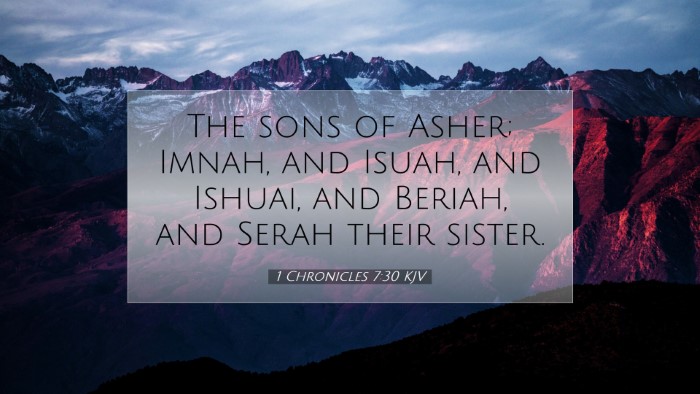Old Testament
Genesis Exodus Leviticus Numbers Deuteronomy Joshua Judges Ruth 1 Samuel 2 Samuel 1 Kings 2 Kings 1 Chronicles 2 Chronicles Ezra Nehemiah Esther Job Psalms Proverbs Ecclesiastes Song of Solomon Isaiah Jeremiah Lamentations Ezekiel Daniel Hosea Joel Amos Obadiah Jonah Micah Nahum Habakkuk Zephaniah Haggai Zechariah MalachiChapter
1 Chronicles 1 1 Chronicles 2 1 Chronicles 3 1 Chronicles 4 1 Chronicles 5 1 Chronicles 6 1 Chronicles 7 1 Chronicles 8 1 Chronicles 9 1 Chronicles 10 1 Chronicles 11 1 Chronicles 12 1 Chronicles 13 1 Chronicles 14 1 Chronicles 15 1 Chronicles 16 1 Chronicles 17 1 Chronicles 18 1 Chronicles 19 1 Chronicles 20 1 Chronicles 21 1 Chronicles 22 1 Chronicles 23 1 Chronicles 24 1 Chronicles 25 1 Chronicles 26 1 Chronicles 27 1 Chronicles 28 1 Chronicles 29Verse
1 Chronicles 7:1 1 Chronicles 7:2 1 Chronicles 7:3 1 Chronicles 7:4 1 Chronicles 7:5 1 Chronicles 7:6 1 Chronicles 7:7 1 Chronicles 7:8 1 Chronicles 7:9 1 Chronicles 7:10 1 Chronicles 7:11 1 Chronicles 7:12 1 Chronicles 7:13 1 Chronicles 7:14 1 Chronicles 7:15 1 Chronicles 7:16 1 Chronicles 7:17 1 Chronicles 7:18 1 Chronicles 7:19 1 Chronicles 7:20 1 Chronicles 7:21 1 Chronicles 7:22 1 Chronicles 7:23 1 Chronicles 7:24 1 Chronicles 7:25 1 Chronicles 7:26 1 Chronicles 7:27 1 Chronicles 7:28 1 Chronicles 7:29 1 Chronicles 7:30 1 Chronicles 7:31 1 Chronicles 7:32 1 Chronicles 7:33 1 Chronicles 7:34 1 Chronicles 7:35 1 Chronicles 7:36 1 Chronicles 7:37 1 Chronicles 7:38 1 Chronicles 7:39 1 Chronicles 7:40

